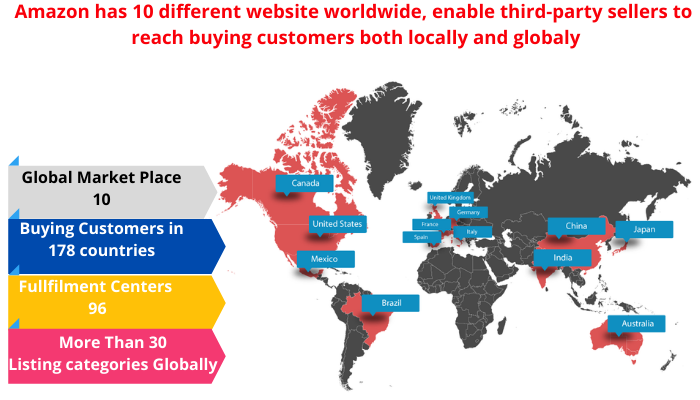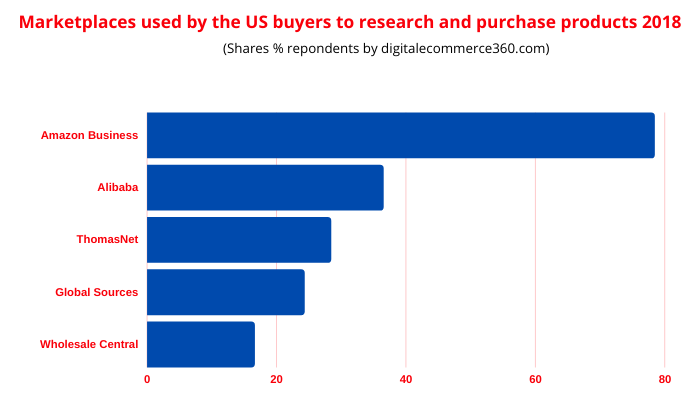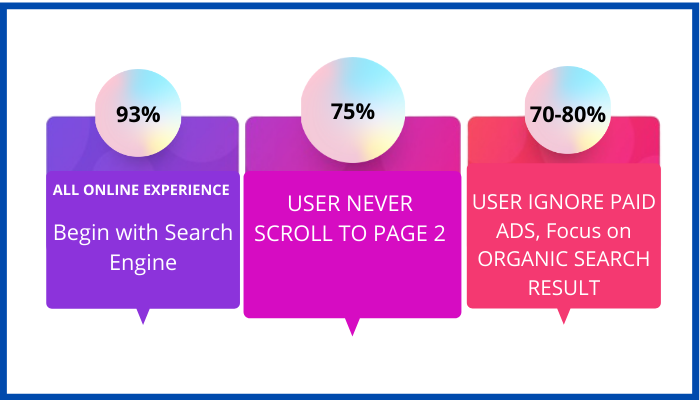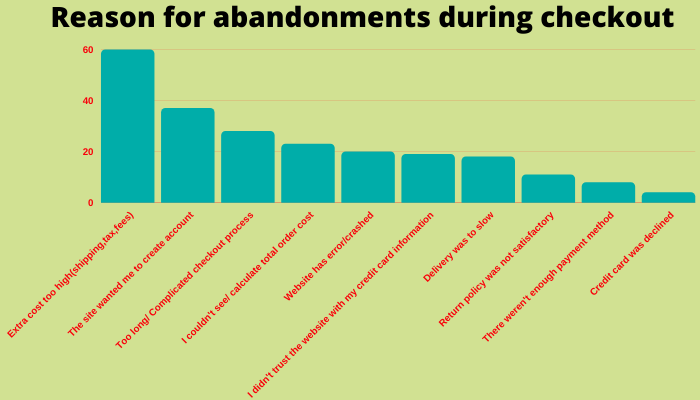The popularity of Amazon is indisputable. From a humble bookselling start-up in 1994 to an eCommerce business giant, Amazon has come a long way. Amazon is holding its share of business in the cut-throat eCommerce business. No other competitor in many countries is anywhere near it. Amazon itself has an inventory of about scaling your eCommerce start-up in the age of Amazon 12 million items across all its categories and services but on a broader level all the items that Marketplace sellers list, that number expands to about 350 million. Amazon was responsible for 45% of US eCommerce spending in 2019 and is expected to rise to 47% in 2020.

With the driving force of Amazon web services, it seems impossible to stop this juggernaut. Amazon is a marketplace where cheap manufacture meets sellers for branding. Amazon’s strategy of flooding cheap products and free shipping has toughened the survival of small and medium-scale competitors. The small e-commerce businesses neither have the capital nor reach of Amazon. Some e-commerce businesses opt for the strategy of competitive pricing. A competitor-based pricing strategy can be sustained during the initial stages of market entry but as you progress you cannot use it effectively. The eCommerce business with low pricing, high operating cost, and expanding its supply chain and distribution network will suffer from the loss.

The above statistics paint a dire picture indeed but all hope is not lost. Amazon’s competitor in many countries has proven that even the dragon giant as Amazon can be slain using the sword of e-commerce solutions and data mining services.

The e-commerce solutions to this modern-day problem can be found in the traditional business model which is still surviving and thriving in this online global marketplace.
Knowing your self
Amazon is become so large and selling everything under the sun that its brand image is turned generic. No consumer in this wanted to link to a bland and vapid brand image. It is a chunk in the armor that can be explored. Why e-commerce businesses like Esty, Myntra, Casper, etc are successful because they know what they are offering. In the bookselling market, Barnes and Noble are giving Amazon a run for its money. Knowing your brand and building its image can help small e-commerce businesses in holding their own in this competition. Be courageous enough to be authentic. Just as a shopkeeper will know what it is offering that shop around the corner is not.
Knowing your market
It is like opening a shop of frozen yogurt where everyone is offering ice cream. The massiveness of Amazon can be used for business advantage as it cannot focus on every market opportunity. When you sell from toothpick to table lamp focused on the quality of every listing becomes sloppy. Another e-commerce giant like Flipkart in India has covered the market of mobile and electronics extensively which Amazon has not focused on. Myntra has covered the market for fashion that Amazon till now is not offering much. Cosmetic market, which is now a fast-growing market, e-commerce brand like Nyaka has covered it. There are many unexplored image source: https://kinsta.com
d avenues in e-commerce business that can be explored.
Seeing through the eyes of the customer
A traditional shop owner will keep the focus on the ambiance and neatness of the shop. That traditional customer experience is replaced with user experience UX in e-commerce. E-commerce business websites should be eye-pleasing and user-friendly. An out-of-place color icon can even turn off some customers and can vow to never return. A single bad experience on a website makes users 88 % less likely to visit the website again. The data mining techniques, data scraping, tools can be utilized that capture various parameters of user behavior on the website. With the analysis of this data, various inferences to visitor behavior can be made.

Ecommerce sites can look for customer’s stay time on-site to track whether it’s up to visitor liking or not. If visitor time of too short or too long both are problems. If it’s too short or abandonment in middle signify that it has not to find a site to his liking. In the case of abandonment, something before abandonment was not working for him. If staying too long means that either website was confusing or it has not found something he was looking for.
Not getting lost in the crowd
Amazon is offering consumers quantity with flooding of products but users prefer quality too sometimes. This trade-off can be managed if the quality product offers at somewhat competitive pricing. But presented with quality products people will choose even if pricy. The demand for Apple products is a living example of this. If you are offering a genuinely good product, without advertising, you will be lost in the sea of cheap products. In traditional business, advertising is done by pamphlets and hoarding. In e-commerce, SEO will help you reach forward pages of search engine listing. The majority of web users are likely to view up to three pages of search engine listing. Your presence of different social media outlets can be like Instagram, Facebook, etc will build brand image, new product advertisement, customer reach, and in turn will increase site visits. As the customer base, today is millennials with ages from 18 to 34 social media presence is essential. Brand storytelling through videos and customer experience promotion have a high social impact on the customer. You can also reach in the prime listing of the search engine when users search for no particular product in mind just through social media presence. When users hit your site even when no sale is made, it can improve your search engine presence.
Knowing your customer
When we visit a shop and the shopkeeper remembers our name, preference, or item we have recently purchased as a customer we feel validated. The same could be offered through sites too. Amazon also utilizes these tools but customer engagement is deep when the business is small and customer connects to brand image. With the utilization of customer behavior data analysis tools customer behavior can be tracked. Customizable site theme, a suggestion based on previous searches, pitching for more items based on online searches, a suggestion for you may also like gives the customer an individualized experience and could hike sales of connected items. Beautiful packaging adds to customer satisfaction. By making packaging interesting so that opening the product itself is an experience for the customer and inspires him to post on social media so that your product gets to advertise for free. Amazon free shipping is difficult to compete but with the help of an efficient and reliable logistic service, this hindrance can be overcome. The clear shipping policy, package tracking, and clear return policy can keep customers happy without free shipping.
Customer a true promoter and reviewer
Some shops offer customers suggestion boxes and reviews shop experience that collecting feedback will help in the improvement of services and removing loopholes that can be used by competitors. On b2b website reviews, storytelling, and suggestion by the customer can be included so that engagement is felt. Sometimes customers like your product but forget to review it. Email appending services, email verification services, or email data validation can be used and Emails can be sent to the customer as a reminder for review. Online visitors are more prone to customer reviews in deciding for purchase of product than product description by seller. Customer loyalty programs like providing pre-sale benefits, exclusive discount offers, limited deals will incentivize customer loyalty and they will feel connected and appreciated. The sellers can be provided with basic and premium membership services through which they can create their homepage, reply to buying leads, and contact buyers. Amazon uses this strategy through Amazon prime services. There are over 150 million Amazon Prime members around the world and they typically spend over $1,000 a year. The estimated percentage of Amazon prime customers is 63%.
Customer forum helps customers connect and make even pitch for product sales. FAQ section can help in resolving doubt. Live chat tools can provide that and may redress many customer issues. A site should provide a room to vent customer frustration or another will. Proper customer complaint mechanism is important and so is its prompt resolution.
The foundation of the Ecommerce Empire
All the strategies are just a building block for e-commerce business but the driving for is SEO, data analytics tool, and skip tracing services. Data verification, address search, web scraping services, data scrubbing, and data appending services play a major role.
These tools will help in b2b lead generation, email address search. Many web services provide e-commerce solutions, cloud computing services, and data servers for storage. With limited investment in dedicated servers, these online services could be used. Analytics tools are crucial to today’s marketing success. Google Analytics, Bitly, Piwik, Open Web Analytics, etc tools are available for free.
Amazon is truly as far-reaching as Amazon River with a dominating presence in 16 countries. B2B giants such as Alibaba, Indiamart, e world trade, etc prove that as uphill the task may be, it could be done.


Recent Comments